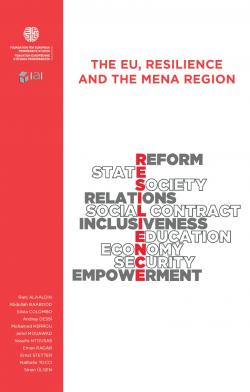The EU, Resilience and the MENA Region
La strategia globale dell’UE indica una serie ambiziosa di obiettivi per rinnovare la politica estera e di sicurezza dell’Unione. Promuovere la resilienza dello stato e della società è uno dei principali obiettivi della strategia, concepito sia come un mezzo per migliorare la prevenzione dei conflitti, sia come un investimento a lungo termine nel buon governo, nella stabilità e nella prosperità. Questo volume raccoglie i risultati di un progetto di ricerca – ideato e realizzato dalla FEPS e dallo IAI – che analizza le diverse interpretazioni della resilienza sulla base di sei stati e contesti sociali in Medio Oriente e Nord Africa, illustrandone i problemi ma anche attori e dinamiche interne a favore delle riforme come primo passo verso rendere operativo il concetto di resilienza.
Risultato del progetto IAI-Feps “The EU’s New Resilience Agenda in the MENA Region”. Presentato all’evento “Resilience and reform in the Middle East and North Africa”, Bruxelles, 8 marzo 2018.
Foreword, by Ernst Stetter and Nathalie Tocci, p. 7-9
Introduction – Framing Resilience: A New Pathway for EU–MENA Relations, by Silvia Colombo and Vassilis Ntousas, p. 11-28
1. The re-emergence of an old concept
2. Resilience and the ambition behind its use in the EU’s external action discourses and practices
3. Resilience at the heart of the EU Global Strategy: From theory to practice
4. The EU, resilience and the MENA region: An agenda for research and policy-making
1. Challenges and Stakes of State and Societal Resilience in Tunisia, by Mohamed Kerrou, p. 29-52
1. Challenges to state and societal resilience
1.1 The security challenge linked to terrorism and national security
1.2 The political challenges of smuggling and corruption
1.3 Social protest movements for employment and development
2. Facilitators for state and societal resilience
2.1 The centralized bureaucratic tradition
2.2 Social reforms and the state reformist tradition
2.3 Civil society, national dialogue and the historical compromise between Islamists and secularists
Conclusion
2. Egypt in Transition: Challenges of State and Societal Resilience, by Eman Ragab, p. 53-73
1. Resilience against what?
2. Deteriorating living conditions
3. Radicalism and terrorism
4. Security vs. political freedoms
Conclusion
3. Unpacking Lebanon’s Resilience: Undermining State Institutions and Consolidating the System?, by Jamil Mouawad, p. 75-89
1. Lebanon’s hailed resilience: How is it understood?
2. Background: State–society relations in Lebanon
3. Resilience of whom and to what?
3.1 The private-public collusion: The trash crisis
3.2 Syrian influx into Lebanon: The pinnacle of resilience?
4. Challenges to resilience: A grim situation
4. Fragility and Resilience in Iraq, by Ranj Alaaldin, p. 91-108
1. Resilience to what? Corruption, governance and security challenges
2. Iraqi society fights back
3. Moving forward
5. A Resilience Approach to a Failed Accession State: The Case of Turkey, by Sinan Ülgen, p. 109-125
1. The Turkish context
2. Defining state-centric resilience: De-democratization and weakening of institutions
3. Defining socio-economic resilience: Slowing growth and rising disparities
4. Positive contributions to resilience
4.1 Society
4.2 State
5. Operationalizing resilience: Modernizing the EU-Turkey Customs Union
6. Qatar’s Resilience Strategy and Implications for State–Society Relations, by Abdullah Baabood, p. 127-155
1. Existential threats
1.1 Protecting the small state
1.2 Mediation and branding as a form of state resilience in Qatar
1.3 Cultural and sports diplomacy
1.4 Defence agreements and foreign military bases in Qatar
2. Economic challenges
2.1 The Qatari State’s economic resilience
2.2 Qatar’s economic diversification
2.3 Sovereign wealth funds
3. Socio-political structures, demography and the labour market
3.1 Qatar’s societal resilience
3.2 Public vs. private sector employment
3.3 Tradition vs. modernization
4. Food security
4.1 Resilience and food security
Conclusion
7. Fostering State and Societal Resilience in the Middle East and North Africa: Recommendations for the EU, by Andrea Dessì, p. 157-194
1. Resilience and breakdown: four principles for EU action in the MENA region
2. State-society relations in the MENA: a breakdown in trust
2.1 Socio-economic challenges and declining state capacity
2.1.1 Corruption and citizen trust in the state
2.1.2 Informal economies and tax reform
2.1.3 The demographic challenge and youth “bulge”
3. Fostering state and societal resilience in the MENA
3.1 Policy recommendations for the EU
Conclusions
Abbreviations and Acronyms, p. 195-197
Contributors, p. 199-204
Tema
Tag
Contenuti collegati
-
Ricerca30/10/2017
The EU’s New Resilience Agenda in the MENA Region
leggi tutto




